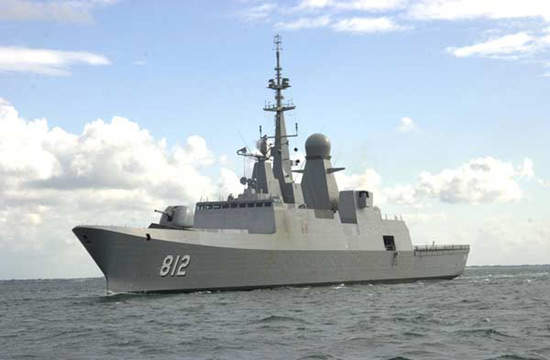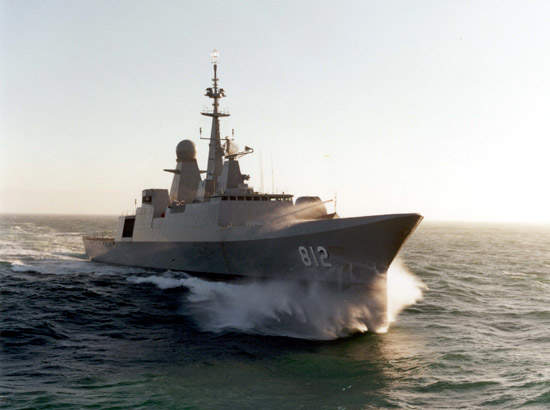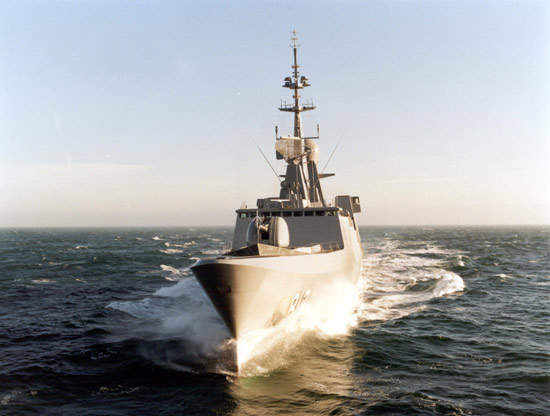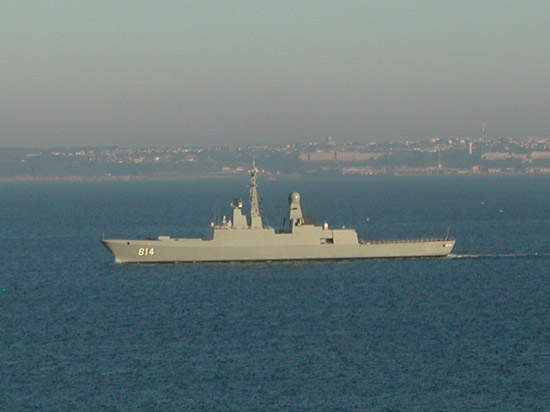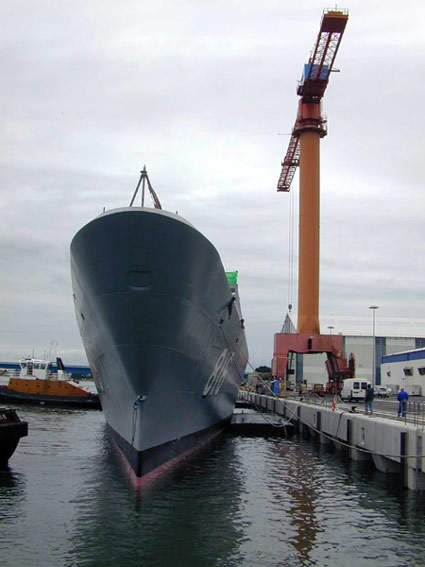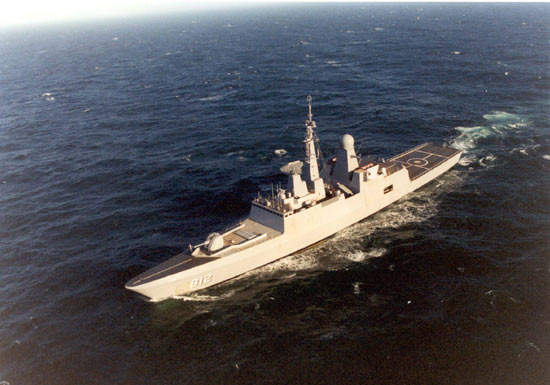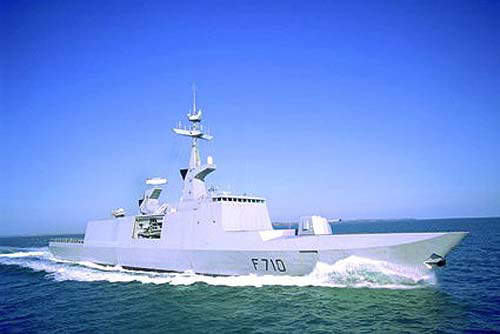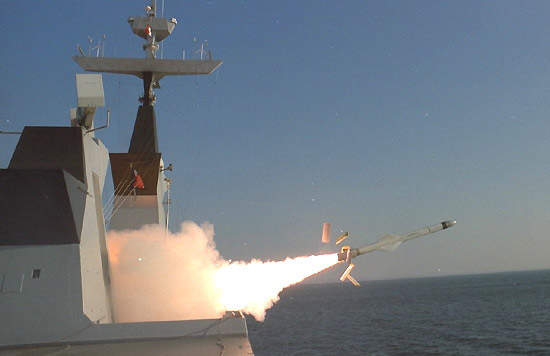Three Al Riyadh (F3000S) Class multipurpose anti-air warfare frigates have been built by DCN of France for the Royal Saudi Naval Forces. The frigates, based on DCN’s stealth frigate design, are about 25% larger than the French La Fayette Class frigate and have additional capabilities, for example enhanced anti-air warfare and anti-submarine capability, to achieve the operational requirements of the Royal Saudi Naval Forces.
The ships have been built at DCN’s Lorient shipyard. The first of class, HMS Al Riyadh (812), was commissioned in July 2002. The second, HMS Makkah (814), was launched in July 2001 and was commissioned in April 2004. The third, HMS Al Damman (816), was launched in September 2002 and delivered in January 2004.
In April 2007, DCN became DCNS. This followed an agreement in which Thales became a 25% shareholder in the new company and DCN acquired the naval business of Thales France (excluding naval equipment). The contract for the first two ships was agreed between France and Saudi Arabia in 1994 under the Sawari II agreement. The contract for the third ship was placed in 1997.
The prime contractor was Thales (now DCNS) which is responsible for the vessel architecture, propulsion systems and combat systems integration. Main contractors include: SFCS (a subsidiary of Armaris, now owned by DCNS), responsible for the ship’s combat systems; MBDA which is supplying missiles; and Sofinfra, which is responsible for the construction of 20,000m² of infrastructure facilities including a school and workshop in Jeddah.
NAVFCO, the training organisation within the French Navy, is contracted to carry out crew and engineering training for over 700 trainee personnel under the Sawari II programme.
Al Riyadh stealth frigate design
The ship’s construction is carried out through the assembly of prefitted hull blocks. The hull has an overall length of 133m and a beam of 17m. The ship has a full load displacement of 4,500t and carries sufficient fuel and stores for a range of 7,000nm between replenishments. Maximum speed is 24.5kt.
The sides of the stealth frigate are sloped at 10° to minimise radar cross section, surfaces have been coated in radar-absorbent paint and the profiles of external features have been reduced. The vessel has a computer-controlled fin-and-rudder stabilisation system which keeps the flight deck operational for 10t class helicopters up to sea state 6.
SFCS automated combat management systems
The ship’s highly automated combat management systems have been developed by SFCS, a subsidiary of Armaris. The SENIT 7 combat system is based on the Thales Tavitac 2000, with additional elements of the SENIT 8 system in service on the Charles de Gaulle aircraft carrier.
Weapons control is provide by the DCNS CTM radar / infrared system, which includes the Thales Castor 2J I-band pulse Doppler radar and an infrared tracking system.
Al Riyadh weapon systems
The ship is being built to carry two eight-cell Sylver vertical launch systems for the Eurosam (MBDA and Thales) Aster 15 surface-to-air missile. Aster 15 is effective at ranges from 1.7km to 30km and to an altitude of 15,000m. Missile guidance is inertial with data uplink and active radar terminal homing. For increased manoeuvrability in the terminal phase, the missile uses a ‘PIF-PAF’ direct thrust control system with gas jets.
All three frigates have been taking part in trial firings of the Aster SAAM (surface-to-air anti-missile) system. Successful firings were conducted by Al Damman in March and Al Riyadh and Makkah in September 2004.
The frigate is armed with eight MBDA Exocet MM40 block II surface-to-surface missiles. The anti-ship missile has a 165kg shaped charge warhead and a range of 70km and approaches the target in sea-skimming mode at high subsonic speed, approximately Mach 0.95.
The ship’s main gun is the Oto Melara 76/62 Super Rapid gun which can fire up to 120 rounds a minute to a maximum range of 20km. There are also two 20mm Giat 15B guns.
There are four 533mm aft torpedo tubes. The ship is armed with the DCNS F17 heavyweight anti-submarine torpedo.
Sensor suite
The sonar suite is the Thales Underwater Systems CAPTAS 20 towed array sonar. CAPTAS (combined active passive towed array sonar) is a low-frequency variable-depth active sonar.
The round radome of the Thales Arabel 3D I-band surveillance and fire control radar is installed on the pyramid mast forward of the hangar and between the two funnels. The Arabel carries out the fire control function for the Aster missiles.
Thales long-range air search radar, DRBV 26D Jupiter operating at D band, is forward of the main radar mast. Two Sperry Marine Decca navigation and helicopter control radars are also fitted.
Countermeasures systems
The electronic warfare suite has been supplied by Thales and includes: DR 3000 electronic support measures (ESM), Altesse communications intercept system, Salamandre B2 radar jammer and TRC 281 communications jammer. Two Sagem Défense Sécurité (formerly EADS Defence & Electronics) Dagaie decoy launchers are also fitted.
DCN Samahe helicopter handling system
The helicopter deck at the stern has a single landing spot for a medium size helicopter, such as the Eurocopter AS 365 Dauphin or the larger AS 532 Cougar or NH90 helicopters.
The deck is fitted with the DCN Samahe helicopter handling system. A fully equipped hangar accommodates one helicopter.
CODAD propulsion system
The vessel’s CODAD (combined diesel and diesel) propulsion system is based on four SEMT Pielstick 16 PA6 STC diesel engines, rated at 5,700kW (7,740hp) each. The diesel engines drive two shafts with Rolls-Royce Kamewa controllable-pitch propellers. DCN has a licence agreement to manufacture these propellers for the Al Riyadh frigates.

